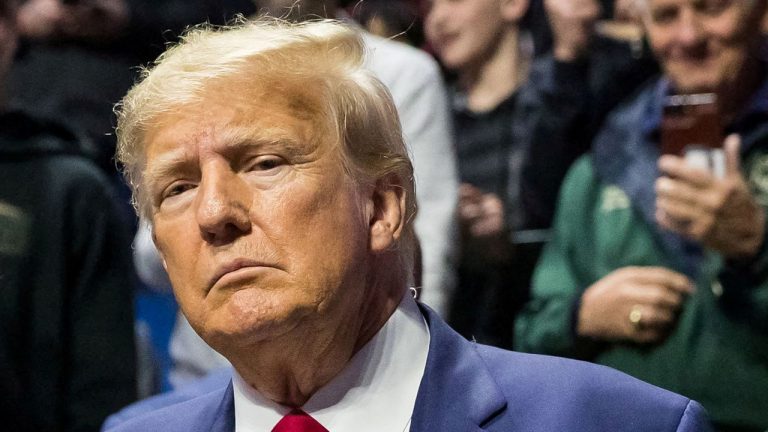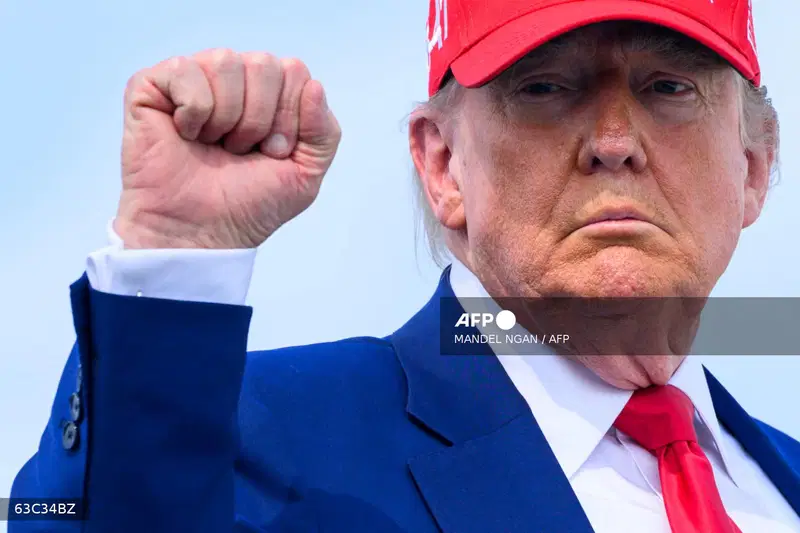Headline
Bully – Iran’s Supreme Leader Declines Nuclear Talks With Trump

Iran’s supreme leader Ayatollah Ali Khamenei on Saturday slammed what he described as bullying tactics a day after US President Donald Trump threatened military action.
“Some bully governments — I really don’t know of any more appropriate term for some foreign figures and leaders than the word bullying — insist on negotiations,” Khamenei told officials after Trump threatened military action if Iran refuses to engage in talks on its nuclear programme.
“Their negotiations are not aimed at solving problems, they aim at domination,” Khamenei said.
On Friday, Trump said he had written to Iran’s supreme leader, urging new talks on the country’s nuclear programme but warning of possible military action if it refuses.
READ ALSO: Trump Backs Off Mexico, Canada Tariffs After Market Blowback
Foreign Minister Abbas Araghchi said Iran had yet to receive any letter from the US president by Saturday.
“We have heard of it (the letter) but we haven’t received anything,” he told state television.
Khamenei accused the bullying powers of deliberately setting new conditions they did not expect Iran to meet.
“They are setting new expectations that they think will definitely not be met by Iran,” he said, without naming the United States or referring to Trump’s comments.
On Friday, Araghchi told AFP in an interview that Iran would not negotiate under “maximum pressure”.
READ ALSO: Trump Accuses Trudeau Of Using Tariffs Dispute To ‘Stay In Power’
The policy, reinstated by Trump on his return to the White House in January, saw him reimpose sweeping sanctions on Tehran during his first term after abandoning the nuclear accord formally known as the Joint Comprehensive Plan of Action (JCPOA).
Struck between Tehran and major powers in 2015, the deal had offered relief from sanctions in exchange for limits on Iran’s nuclear activities.
Tehran has in recent months engaged in diplomatic efforts with the three European parties to the deal — Britain, France and Germany — aimed at resolving issues surrounding its nuclear ambitions.
However on Saturday, Khamenei condemned the three governments for “declaring that Iran has not fulfilled its nuclear commitments under the JCPOA”.
“You say that Iran has not fulfilled its commitments under the JCPOA. Okay, have you fulfilled your commitments under the JCPOA?” he asked.
READ ALSO: Supreme Court Rejects Trump Bid To Freeze $2bn In Foreign Aid
– Peaceful nature –
Khamenei recalled that Tehran had abided by the terms of the JCPOA for a whole year after Trump abandoned it in 2018 before beginning to roll back on its own commitments.
He said there had been “no other way” following legislation by the Iranian parliament.
Iran has since sharply ramped up its enrichment of uranium far beyond the limits set by the JCPOA.
US officials now estimate that Iran could produce a nuclear weapon within weeks if it chose to do so.
Tehran has consistently denied pursuing a nuclear arsenal, emphasising the peaceful nature of its programme.
READ ALSO: 16 Things Trump And His Team Did In Three Weeks
Officials have always cited a religious decree issued by Khamenei that prohibits the development of such weapons.
Last month, Khamenei reiterated his opposition to negotiations with the United States, calling the idea “unwise” after Trump called for a new nuclear deal.
Khamenei charged that Washington “ruined, violated, and tore up” the 2015 agreement.
In 2019, more than a year after Trump’s withdrawal from the JCPOA, Japan’s then prime minister Shinzo Abe visited Iran in an attempt to mediate.
But Khamenei firmly rejected the possibility of talks with Washington, saying he did not “consider Trump as a person worthy of exchanging messages with”.
Headline
U.S. Lawmaker Reacts To Nigeria, U.S. Airstrikes

United States Congressman, Riley Moore, has stated that President Donald Trump is determined to put an end to the killing of Christians in Nigeria, warning that further action may follow if the violence persists.
Moore made the statement on Friday via his official X handle.
According to the lawmaker, the strike represents the first step in addressing what he described as the ongoing slaughter of Christians and the broader security crisis affecting Nigerians across religious and ethnic lines.
READ ALSO:US Dept Of War Shares Video Of Air Strikes In Nigeria
“President Trump has been clear that the killing of Christians in Nigeria must end,” he said.
He that the administration’s resolve on the matter should not be underestimated.
“As I stated at the outset: Do not test President Trump‘s resolved in this matter.
READ ALSO:JUST IN: US Forces Bomb Terrorists Camps In Nigeria
“Tonight’s strike in coordination with the Nigerian government is just the first step to ending the slaughter of Christians and the security crisis affecting all Nigerians,” he said.
He stressed that the operation signals a stronger stance by the United States in support of Nigeria’s efforts to tackle terrorism and violent extremism, noting that further measures could be taken if the situation does not improve.
Headline
US Dept Of War Shares Video Of Air Strikes In Nigeria

A video footage of the US military air strikes in Nigeria has emerged.
The video was released by the US Department of War following its air strikes against terrorists in Sokoto.
Earlier, the US secretary of War, Pete Hegseth had confirmed that military air strikes hit terrorists in Nigerians, saying it was deadly.
Later on, the US. African Command, confirmed that it conducted the attacks described as very deadly by President Donald Trump.
Trump said he was only keeping the promise he made earlier last month to strike the terrorists he believes are killing innocent Christians.
READ ALSO:JUST IN: US Forces Bomb Terrorists Camps In Nigeria
Although described as powerful and deadly, the casualty caused by the attack is yet to be released.
Explaining further, security expert, Brant Philip, said the strikes may have been launched “from the USS Paul Ignatius, using a Tomahawk missile.”
The Nigerian government through its ministry of foreign affairs has also confirmed that the strikes were successful.
Watch video here
Headline
JUST IN: US Forces Bomb Terrorists Camps In Nigeria

United States President Donald Trump said US forces conducted deadly strikes against Islamic State terrorists in northwestern Nigeria, and vowed more attacks if the militants keep killing Christians.
“I have previously warned these Terrorists that if they did not stop the slaughtering of Christians, there would be hell to pay, and tonight, there was,” Trump posted on his Truth Social platform, adding that “the Department of War executed numerous perfect strikes.”
READ ALSO:JUST IN: Kano Lawmaker, Sarki Aliyu Daneji, Dies Hours After Colleague’s Passing
Trump stated that the Department of War “executed numerous perfect strikes, as only the United States is capable of doing. Under my leadership, our Country will not allow Radical Islamic Terrorism to prosper.”
The US president wished everyone Merry Christmas, “including the dead Terrorists, of which there will be many more if their slaughter of Christians continues.”
Details later.

 News4 days ago
News4 days agoPHOTOS: New Era In Furupagha-Ebijaw As Okpururu 1 Receives Staff Of Office

 News3 days ago
News3 days agoUBTH CMD Marks 120 Days In Office, Expresses Commitment To Providing Conducive Working Environment

 News4 days ago
News4 days agoOPINION: Gumi And His Terrorists

 News3 days ago
News3 days agoFIRS Confirms NIN As Tax ID

 News4 days ago
News4 days agoFG Declares Public Holidays For Christmas, New Year Celebrations

 Metro3 days ago
Metro3 days agoFintiri Pardons Man Sentenced To Death For ‘Killing Herdsman In Self-defence’, Others

 News4 days ago
News4 days agoOPINION: Christmas And A Motherless Child

 News3 days ago
News3 days agoOPINION: My Man Of The Season

 News2 days ago
News2 days agoJUST IN: Kano Lawmaker, Sarki Aliyu Daneji, Dies Hours After Colleague’s Passing

 News3 days ago
News3 days agoKWAM 1 Withdraws From Awujale Race, Ends Court Challenge


























